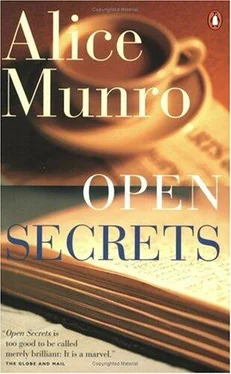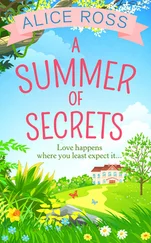Instead, Cleata talked about the book she was reading, The Anglo-Saxon Chronicle . She said that the reason the Dark Ages were dark was not that we couldn’t learn anything about them but that we could not remember anything we did learn, and that was because of the names.
“Caedwalla,” she said. “Egfrith. These are just not names on the tip of your tongue anymore.”
Gail was trying to remember which ages, or centuries, were dark. But her ignorance didn’t embarrass her. Cleata was making fun of all that, anyway.
“Aelfflaed,” said Cleata, and spelled it out. “What kind of a heroine is Aelfflaed?”
When Cleata wrote to Will, she probably wrote about Aelfflaed and Egfrith. Not about Gail. Not Gail was here looking very pretty in some kind of silky gray summer-pajamas outfit. She was in good form, made various witty remarks.… No more than she would say to Gail, “I have my doubts about the lovebirds. Reading between the lines, I can’t help wondering if disillusionment isn’t setting in.…”
When she met Will and Cleata, Gail thought they were like characters in a book. A son living with his mother, apparently contentedly, into middle age. Gail saw a life that was ceremonious and absurd and enviable, with at least the appearance of celibate grace and safety. She still sees some of that, though the truth is Will has not always lived at home, and he is neither celibate nor discreetly homosexual. He had been gone for years, into his own life — working for the National Film Board and the Canadian Broadcasting Corporation — and had given that up only recently, to come back to Walley and be a teacher. What made him give it up? This and that, he said. Machiavellis here and there. Empire-building. Exhaustion.
Gail came to Walley one summer in the seventies. The boyfriend she was with then was a boatbuilder, and she sold clothes that she made — capes with appliqués, shirts with billowing sleeves, long bright skirts. She got space in the back of the craft shop, when winter came on. She learned about importing ponchos and thick socks from Bolivia and Guatemala. She found local women to knit sweaters. One day Will stopped her on the street and asked her to help him with the costumes for the play he was putting on— The Skin of Our Teeth . Her boyfriend moved to Vancouver.
She told Will some things about herself early on, in case he should think that with her capable build and pink skin and wide gentle forehead she was exactly the kind of a woman to start a family on. She told him that she had had a baby, and that when she and her boyfriend were moving some furniture in a borrowed van, from Thunder Bay to Toronto, carbon-monoxide fumes had leaked in, just enough to make them feel sick but enough to kill the baby, who was seven weeks old. After that Gail was sick — she had a pelvic inflammation. She decided she did not want to have another child and it would have been difficult anyway, so she had a hysterectomy.
Will admired her. He said so. He did not feel obliged to say, What a tragedy! He did not even obliquely suggest that the death was the result of choices Gail had made. He was entranced with her then. He thought her brave and generous and resourceful and gifted. The costumes she designed and made for him were perfect, miraculous. Gail thought that his view of her, of her life, showed a touching innocence. It seemed to her that far from being a free and generous spirit, she had often been anxious and desperate and had spent a lot of time doing laundry and worrying about money and feeling she owed so much to any man who took up with her. She did not think she was in love with Will then, but she liked his looks — his energetic body, so upright it seemed taller than it was, his flung-back head, shiny high forehead, springy ruff of graying hair. She liked to watch him at rehearsals, or just talking to his students. How skilled and intrepid he seemed as a director, how potent a personality as he walked the high-school halls or the streets of Walley. And then the slightly quaint, admiring feelings he had for her, his courtesy as a lover, the foreign pleasantness of his house and his life with Cleata — all this made Gail feel like somebody getting a unique welcome in a place where perhaps she did not truly have a right to be. That did not matter then — she had the upper hand.
So when did she stop having it? When he got used to sleeping with her when they moved in together, when they did so much work on the cottage by the river and it turned out that she was better at that kind of work than he was?
Was she a person who believed that somebody had to have the upper hand?
There came a time when just the tone of his voice, saying “Your shoelace is undone” as she went ahead of him on a walk — just that — could fill her with despair, warning her that they had crossed over into a bleak country where his disappointment in her was boundless, his contempt impossible to challenge. She would stumble eventually, break out in a rage — they would have days and nights of fierce hopelessness. Then the breakthrough, the sweet reunion, the jokes, and bewildered relief. So it went on in their life — she couldn’t really understand it or tell if it was like anybody else’s. But the peaceful periods seemed to be getting longer, the dangers retreating, and she had no inkling that he was waiting to meet somebody like this new person, Sandy, who would seem to him as alien and delightful as Gail herself had once been.
Will probably had no inkling of that, either.
He had never had much to say about Sandy — Sandra — who had come to Walley last year on an exchange program to see how drama was being taught in Canadian schools. He had said she was a young Turk. Then he had said she mightn’t even have heard that expression. Very soon, there had developed some sort of electricity, or danger, around her name. Gail got some information from other sources. She heard that Sandy had challenged Will in front of his class. Sandy had said that the plays he wanted to do were “not relevant.” Or maybe it was “not revolutionary.”
“But he likes her,” one of his students said. “Oh, yeah, he really likes her.”
Sandy didn’t stay around long. She went on to observe the teaching of drama in the other schools. But she wrote to Will, and presumably he wrote back. For it turned out that they had fallen in love. Will and Sandy had fallen seriously in love, and at the end of the school year Will followed her to Australia.
Seriously in love. When Will told her that, Gail was smoking dope. She had taken it up again, because being around Will was making her so nervous.
“You mean it’s not me?” Gail said. “You mean I’m not the trouble?”
She was giddy with relief. She got into a bold and boisterous mood and bewildered Will into going to bed with her.
In the morning they tried to avoid being in the same room together. They agreed not to correspond. Perhaps later, Will said. Gail said, “Suit yourself.”
But one day at Cleata’s house Gail saw his writing on an envelope that had surely been left where she could see it. Cleata had left it — Cleata who never spoke one word about the fugitives. Gail wrote down the return address: 16 Eyre Rd., Toowong, Brisbane, Queensland, Australia.
It was when she saw Will’s writing that she understood how useless everything had become to her. This bare-fronted pre-Victorian house in Walley, and the veranda, and the drinks, and the catalpa tree that she was always looking at, in Cleata’s back yard. All the trees and streets in Walley, all the liberating views of the lake and the comfort of the shop. Useless cutouts, fakes and props. The real scene was hidden from her, in Australia.
That was why she found herself sitting on the plane beside the woman with the diamond rings. Her own hands have no rings on them, no polish on the nails — the skin is dry from all the work she does with cloth. She used to call the clothes she made “handcrafted,” until Will made her embarrassed about that description. She still doesn’t quite see what was wrong.
Читать дальше












